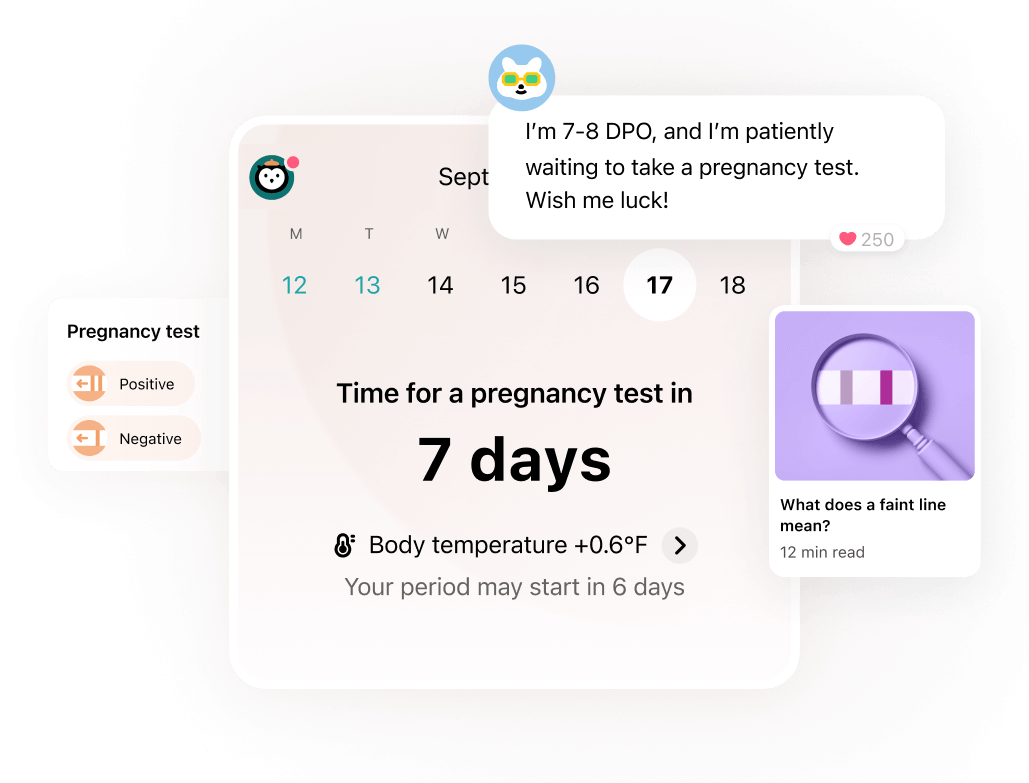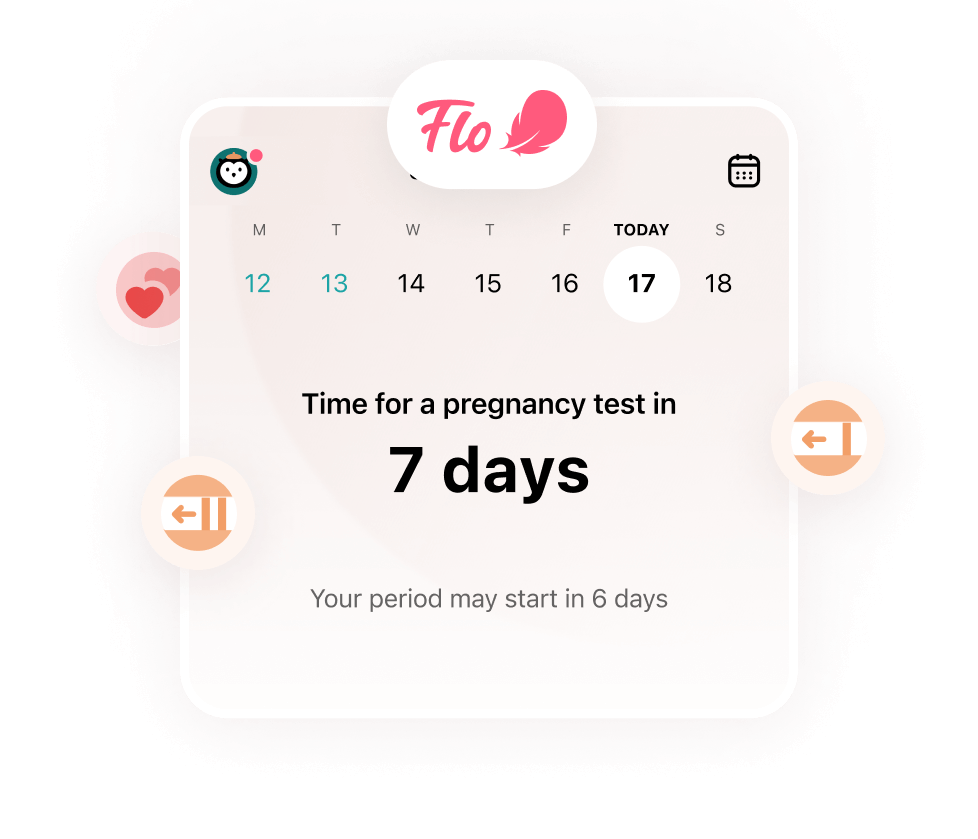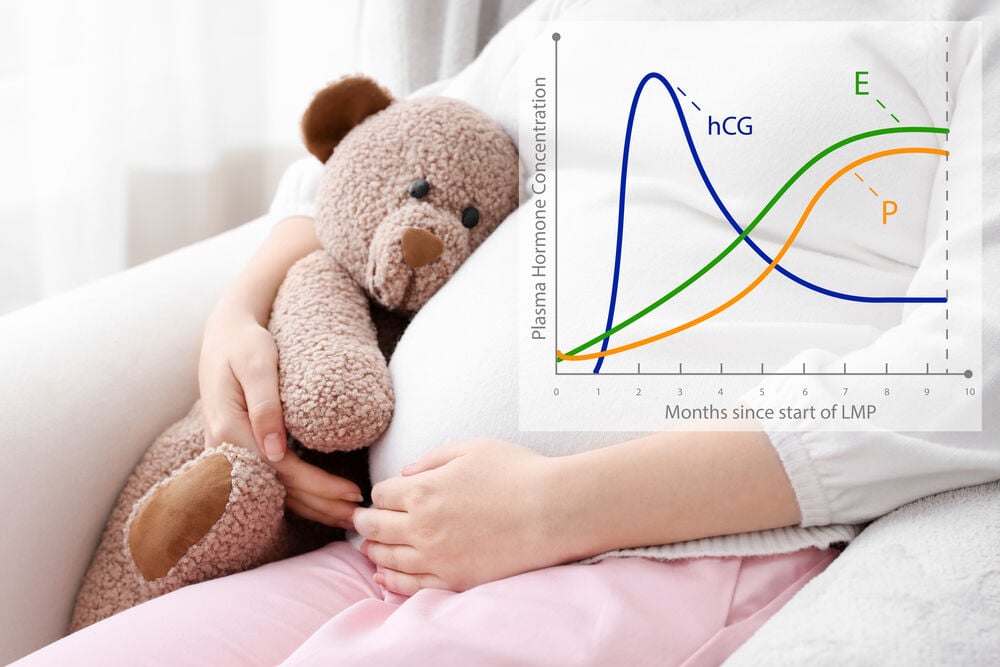hCG pregnancy tests are quite easy to use, but they still raise a lot of questions among Flo users. Today, we're answering all of them!
-
Tracking cycle
-
Getting pregnant
-
Pregnancy
-
Help Center
-
Flo for Partners
-
Anonymous Mode
-
Flo app reviews
-
Flo Premium New
-
Secret Chats New
-
Symptom Checker New
-
Your cycle
-
Health 360°
-
Getting pregnant
-
Pregnancy
-
Being a mom
-
LGBTQ+
-
Quizzes
-
Ovulation calculator
-
hCG calculator
-
Pregnancy test calculator
-
Menstrual cycle calculator
-
Period calculator
-
Implantation calculator
-
Pregnancy weeks to months calculator
-
Pregnancy due date calculator
-
IVF and FET due date calculator
-
Due date calculator by ultrasound
-
Medical Affairs
-
Science & Research
-
Pass It On Project New
-
Privacy Portal
-
Press Center
-
Flo Accuracy
-
Careers
-
Contact Us
13 Definitive Answers to Your Questions about hCG Pregnancy Tests


Every piece of content at Flo Health adheres to the highest editorial standards for language, style, and medical accuracy. To learn what we do to deliver the best health and lifestyle insights to you, check out our content review principles.
When does your body start producing hCG?
A pregnancy test reacts to human chorionic gonadotropin (hCG), the hormone that your body starts producing when the embryo attaches to the uterine wall. This happens between days six and 10 after fertilization.
Sensitive tests detecting hCG in urine may indicate pregnancy on the first day of a missed period, while the majority of home tests detect it on days five to 10 from your expected period.

 Over
7.8M
ratings averaging
4.8/5
*
Over
7.8M
ratings averaging
4.8/5
*
Make sense of pregnancy testing with the Flo app
- Know when it’s the right time to take a test.
- Log results of previous pregnancy tests.
- Chat with others who are trying.
 Over
7.8M
ratings averaging
4.8/5
*
Over
7.8M
ratings averaging
4.8/5
*

Hoping for a positive pregnancy test?
The Flo app can help you on your path to parenthood.

 Over
7.8M
ratings averaging
4.8/5
*
Over
7.8M
ratings averaging
4.8/5
*
Make sense of pregnancy testing with the Flo app
- Know when it’s the right time to take a test.
- Log results of previous pregnancy tests.
- Chat with others who are trying.
Which hCG test is more sensitive?
A blood test for hCG can show a positive result earlier than the most sensitive urine test. Home pregnancy tests that detect hCG in urine also have different sensitivities.
On the test package, it will say 10, 20, or 25 mIU/mL. The smaller the number, the higher the sensitivity of the test. You can use our hCG calculator to work out your hCG levels at home.
Which hCG test can determine the most accurate gestational age?
The level of hCG is indicated by blood test results. To interpret your results, doctors refer to medical tables showing the correspondence between the hCG value and a certain time in pregnancy.
Initially, hCG doubles every two to three days and reaches its maximum by weeks nine to 10 of pregnancy. At-home urine tests for hCG only detect its presence, not the amount. Thus, they cannot indicate the baby’s gestational age.
Take a quiz
Find out what you can do with our Health Assistant
Which home pregnancy test does not require collecting urine in a cup?
The surest way to get an accurate pregnancy test is to follow the manufacturer's recommendations. Midstream tests do not require collecting urine. Instead, put the appropriate end of the test under your urine stream for a few seconds and wait until the result appears.
Alternatively, the test strips are dipped into a container of collected urine. Cassette tests involve collecting urine in a cup and then pipetting a few drops of it onto a test strip.
Which home pregnancy test minimizes the most errors?
Cassette and digital home pregnancy tests can exclude the errors of analyzing and interpreting the results.
There is no need to guess what a faint line means because either a plus sign (+) / minus sign (–) or "pregnant" / "not pregnant" will appear on the screen.
What time of the day is best for taking a home pregnancy test?
Your first-morning urine, which accumulates in the bladder overnight (after more than four hours of continuous sleep), contains the maximum amount of hCG.
Therefore, most health care providers recommend taking a test in the morning. Extremely diluted urine due to excessive drinking can make the line too faint or give a false-negative result.
Why is the second line on the test faint or faded?
A faint line may appear due to an insufficient urine level of hCG. It can also occur if you did not follow the instructions.
In most cases, even a faint second line on a home test indicates pregnancy, if it has been carried out correctly. To confirm your results, you can:
- take a more sensitive pregnancy test
- request an hCG blood test
- take another at-home test (not necessarily from the same manufacturer) in a few days
What are the general recommendations to follow when taking a home pregnancy test?
To avoid false-negative and false-positive results from a home pregnancy test, make sure to follow the instructions, store the package at the right temperature, and interpret your results after the correct amount of time.
Also, make sure not to use expired test kits.


Can a home pregnancy test be a false-positive?
A home pregnancy test can yield a false-positive result for several reasons:
- the instructions were not strictly followed
- the results were interpreted later than the recommended time
- you are taking drugs containing hCG
- the test kit was not stored properly
- you have recently experienced a miscarriage, a premature birth, or an abortion
- you have a hormone-dependent illness
If you aren’t sure about the results of the test, take another one in a few days.
Can a home pregnancy test be false-negative?
Several factors can lead to a false-negative home pregnancy test:
- the instructions were not strictly followed
- the test kit is expired
- the test was done too early in your cycle
- the urine was diluted
Try retesting in a few days.
What can distort pregnancy test results?
If you are taking fertility medications containing hCG, the results of a home pregnancy test may be affected.
Alcohol consumption, lactation, menopause, and the intake of most medicines usually will not affect the test results.
Can an ectopic pregnancy give a positive pregnancy test result?
A pregnancy test reacts to the hCG that is produced by the embryo and released into the pregnant person’s bloodstream.
For an ectopic pregnancy, the implantation site (e.g., the uterine wall or another organ) does not matter. Ectopic pregnancy can be signaled by blood spotting and/or pain in the lower abdomen, as well as by the slow increase of hCG in the blood.
If you suspect an ectopic pregnancy, be sure to consult a health care provider.
When should an hCG level be rechecked?
After a positive test result, your health care provider will complete several blood tests to monitor the changes in your hCG level. A slow increase doesn't necessarily indicate a problem, but it requires additional clarification.
Normally, the amount of hCG should double every 48–72 hours or increase by 60 percent or more every two days.
If your hCG levels don’t double, it may indicate a nonviable pregnancy, whether intrauterine or extrauterine.
A rapid increase of hCG in the blood can indicate, among other things, twins or triplets.


Hey, I'm Anique
I started using Flo app to track my period and ovulation because we wanted to have a baby.


The Flo app helped me learn about my body and spot ovulation signs during our conception journey.


I vividly
remember the day
that we switched
Flo into
Pregnancy Mode — it was
such a special
moment.
Real stories, real results
Learn how the Flo app became an amazing cheerleader for us on our conception journey.
References
“Doing a Pregnancy Test.” NHS Choices, NHS, www.nhs.uk/pregnancy/trying-for-a-baby/doing-a-pregnancy-test/.
Betz, Danielle. “Human Chorionic Gonadotropin.” StatPearls [Internet]., U.S. National Library of Medicine, 30 Aug. 2020, www.ncbi.nlm.nih.gov/books/NBK532950/.
“Pregnancy Test: MedlinePlus Medical Test.” MedlinePlus, U.S. National Library of Medicine, 3 Dec. 2020, medlineplus.gov/lab-tests/pregnancy-test/.
“Home Pregnancy Tests: Can You Trust the Results?” Mayo Clinic, Mayo Foundation for Medical Education and Research, 12 Jan. 2019, www.mayoclinic.org/healthy-lifestyle/getting-pregnant/in-depth/home-pregnancy-tests/art-20047940.
History of updates
Current version (07 September 2022)
Published (29 November 2018)
In this article

Get your personal guide to fertility
-
Learn how to read your body's ovulation signals
-
Find daily conception tips from our experts
-
Chat with others who are trying to get pregnant




